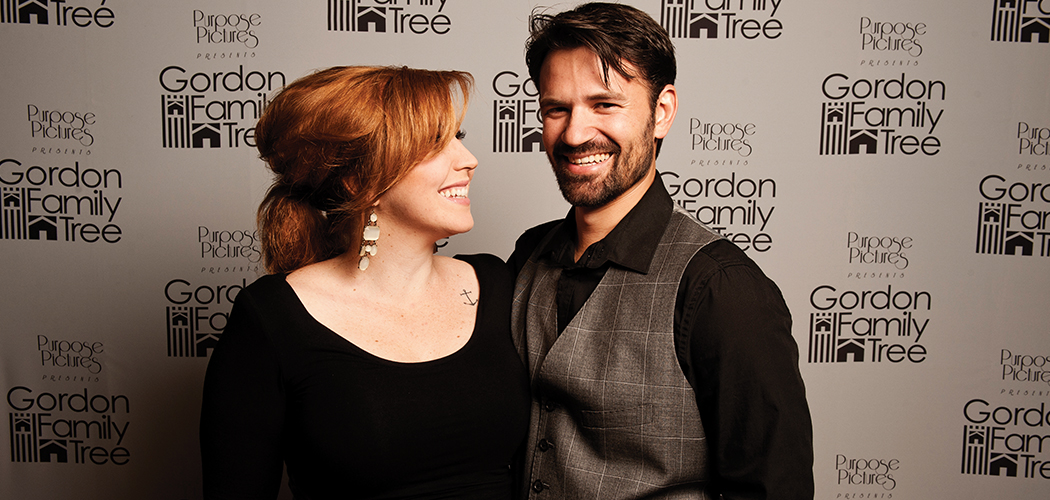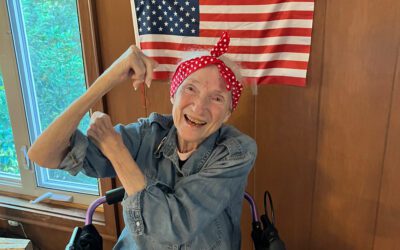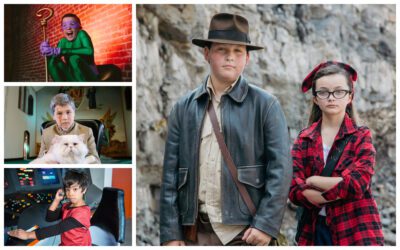[title subtitle=”words: Marcus Coker
Images: courtesy Parkers Anchor”][/title]
From now until January 16, a crew of actors, producers, and set hands will gather from across the country to meet in Fayetteville, Arkansas, with the singular goal of filming a movie called Parker’s Anchor, the fictional story of a woman whose search for a family to call her own leads her through disappointment, acceptance, and finally, celebration.
Parker’s Anchor is the story of Krystal Parker, a married woman from Los Angeles, who plans to have a child with her husband. However, when she discovers she’s infertile, her husband leaves her and Krystal moves to Fayetteville to pick up the pieces and begin again. Along the way, Krystal makes new friends and adopts a child, finding love, not where she’d planned, but where it was waiting for her all along.
“You find yourself in your twenties and thirties, and things don’t pan out like you thought,” says Jennica Schwartzman, who’s thirty, from Los Angeles, and the lead actress for Parker’s Anchor. “You’re starting a new chapter, so what do you do? What does that look like when life changes and your identity changes along with it?”
Jennica, in addition to playing Krystal Parker, is a co-writer of the film along with her husband, Ryan. The couple is producing the movie through their company, Purpose Pictures. “We didn’t start writing it until I was pregnant in 2013, but I’d always wanted to write about adoption, in part because our nephew is adopted,” says Jennica.
Several of the actors are seasoned performers, including Sarah Colonna, who grew up in Farmington and graduated from the drama department at the University of Arkansas. She’s a New York Times best-selling author and is often seen on Chelsea Lately.
Local actors and actresses will play a total of sixteen roles, whose character ages range from nine to early sixties. Jennica says, “When we held a casting call in Fayetteville last September, we knew we would have a hard time deciding. We saw so much talent, and that was a positive problem we were happy to encounter.”
The filming of Parker’s Anchor marks the second time the Schwartzmans have made a movie in Arkansas, which is home to Ryan’s family. Their first film, Gordon Family Tree, was released in 2014 and was directed by Marc Hampson of Anaheim, California, who is also directing Parker’s Anchor.
Another producer, as well as a casting director for the film, is Elizabeth Barnes Keener, who’s from Fort Smith and now lives in Los Angeles. Her casting director credits include the shows Studio 60 on the Sunset Strip and Revenge. “I run into a lot of people who say they’re making a movie, and the percentage of people who actually do it is very small,” says Elizabeth, “so what Ryan and Jennica have done and are doing again is a big accomplishment. When they filmed Gordon Family Tree, Ryan was the lead actor, and Jennica came in and stole a scene. Ryan said, ‘When we do the next movie, it’s Jennica’s turn to be in front of the camera, and I’m going to be behind the scenes to support her.’ And they give like that in every aspect of their lives, which is one of the reasons they are so good to work with.”
Elizabeth says, “Los Angeles is an industry town, so everything is a transaction, a business. It’s great making a movie in Northwest Arkansas because people are interested in the art and experience of it. All of our sponsors get something from it, but it’s not always a financial transaction.” To that end, dozens of local businesses will be contributing to or shown in Parker’s Anchor, including Greenhouse Grille, Hawaiian Brian’s, Theo’s, The Mustache, and Fayetteville High School. In most cases, business names and logos will stay the same, which will help create what Jennica calls “a realistic sense of place.”
Elizabeth’s husband, Brandon Keener, will also have a role in the film. Brandon, who grew up in Fort Smith, also graduated from the drama department at U of A and was in He’s Just Not That Into You and Catch Me If You Can. Additionally, film music will be provided in part by local musicians Shannon Wurst and Trout Fishing in America.
One of the words Jennica uses to describe both the movie and the movie-making process is “magical.” As an example, she tells the story of Brian and Ashley Bailey, who own The Mustache (a quirky gift and clothing store) on the Square in Fayetteville and will be lending their home as a shooting location for the film. Jennica says, “They put online that they are opening a sister shop called The Anchor [that will sell home goods]. Well, in our story, Krystal opens a shop called The Anchor. It couldn’t be more perfect. And we’ve encountered help like that at every step.”
Elizabeth says, “Once you start telling people what you are doing, people just come forward. So we all get to do something together. They’re happy. You’re happy.”
It’s magical.
For the Schwartzmans and Elizabeth, there’s a certain trust that comes along with the entire process, a knowing that things will work out the way they should. Jennica says, “It’s a theme in the movie too. There’s no such thing as a plan that didn’t work out. When you get to the end, there’s no Plan B. This was the plan; it was destined. No matter what your family looks like, it’s supposed to be that way. Nothing wrong happened.”
During the process, Jennica is keeping a digital “Filmmaker’s Bible,” a binder that includes copies of contracts, agreements, and to-do lists. The reason? Whenever she encounters someone wanting to learn about making a movie, she can send them a copy. She says, “Education is a big part of the process. The next group of filmmakers needs to be ten steps ahead of me. People say, ‘If you live in the penthouse, send the elevator down.’ But if I live in the penthouse, I need to build above me. And they should also send the elevator down.”
Once shooting is finished, Jennica is hoping for nine months of post-production and editing, resulting in a movie that’s an hour and a half long. After that, there will be a red-carpet premier somewhere between the summer of 2016 and the winter of 2017.
When Jennica talks about Parker’s Anchor, it’s clear she’s making a big commitment. The licensing agreements for film distribution last fifteen years, which means fifteen years of paperwork and tax forms. As producers of the film, Ryan and Jennica are self-financing the film with the exception of just over twenty-five thousand dollars they raised online from over two hundred and fifty donors via Kickstarter, a website that allows people to donate money to creative projects.
Jennica says, “Self-financing means debt, as much legal debt as we can acquire. And it’s an uphill battle all the way. This is the hardest thing I’ve ever done. We can’t buy a house. We can’t send our child to private school. But I truly believe in the projects we are making, that they enrich the lives of others. That’s why we do it. I believe someone’s going to watch the film and Google adoption and go, ‘I didn’t even know I wanted you, but I’m so glad I found you.’”
If you’ve ever been changed by a story—a movie, a book—you understand. Stories have power, especially ones that are told from a generous heart like Jennica’s, whose goal is to give so that someone else may receive. If that’s not magic, nothing is.




